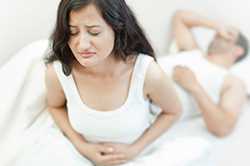Symptoms & Treatment
 What are the signs and symptoms of typhoid fever?
What are the signs and symptoms of typhoid fever?
Persons with typhoid fever usually have a sustained fever as high as 103° to 104° F (39° to 40° C). They may also feel weak, or have stomach pains, headache, or loss of appetite. In some cases, patients have a rash of flat, rose-colored spots. The only way to know for sure if an illness is typhoid fever is to have samples of stool or blood tested for the presence of Salmonella Typhi.
What do you do if you think you have typhoid fever?
If you have a high fever and feel very ill, see a doctor immediately. If you are traveling in a foreign country, you can usually call the U.S. consulate for a list of recommended doctors. For more information about medical care abroad, see Getting Health Care Abroad and a list of International Joint Commission-accredited facilities.
Typhoid fever is treated with antibiotics. Resistance to multiple antibiotics is increasing among Salmonella that cause typhoid fever. Reduced susceptibility to fluoroquinolones (e.g., ciprofloxacin) and the emergence of multidrug-resistance has complicated treatment of infections, especially those acquired in South Asia. Antibiotic susceptibility testing may help guide appropriate therapy. Choices for antibiotic therapy include fluoroquinolones (for susceptible infections), ceftriaxone, and azithromycin. Persons who do not get treatment may continue to have fever for weeks or months, and as many as 20% may die from complications of the infection.
Typhoid fever’s danger doesn’t end when symptoms disappear
Even if your symptoms seem to go away, you may still be carrying Salmonella Typhi. If so, the illness could return, or you could pass the disease to other people. In fact, if you work at a job where you handle food or care for small children, you may be barred legally from going back to work until a doctor has determined that you no longer carry any typhoid bacteria.
If you are being treated for typhoid fever, it is important to do the following:
- Keep taking the prescribed antibiotics for as long as the doctor has asked you to take them.
- Wash your hands carefully with soap and water after using the bathroom, and do not prepare or serve food for other people. This will lower the chance that you will pass the infection on to someone else.
- Have your doctor perform a series of stool cultures to ensure that no Salmonella Typhi bacteria remain in your body.
Vaccine and Travel Information
- Page last reviewed: March 25, 2013
- Page last updated: May 12, 2016
- Content Source:


 ShareCompartir
ShareCompartir